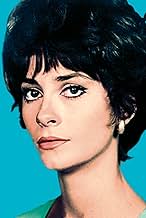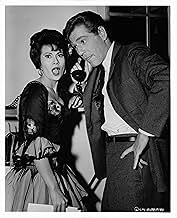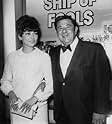VALUTAZIONE IMDb
7,0/10
7473
LA TUA VALUTAZIONE
Aggiungi una trama nella tua linguaA varied group of passengers boarding a ship bound for pre-WWII Germany represents a microcosm of early-1930s society.A varied group of passengers boarding a ship bound for pre-WWII Germany represents a microcosm of early-1930s society.A varied group of passengers boarding a ship bound for pre-WWII Germany represents a microcosm of early-1930s society.
- Regia
- Sceneggiatura
- Star
- Vincitore di 2 Oscar
- 5 vittorie e 13 candidature totali
José Ferrer
- Siegfried Rieber
- (as Jose Ferrer)
José Greco
- Pepe
- (as Jose Greco)
Heinz Rühmann
- Julius Löwenthal
- (as Heinz Ruehmann)
Recensioni in evidenza
A grim long voyage with an earnest script by the remarkable Abby Mann and a respectful Stanley Kramer at the helm. Assorted desperate characters makes the sailing a gripping one. When the extraordinary Simone Signoret, Oskar Werner and Vivien Leigh are on, we're there with them one hundred per cent. Simone Signoret's addicted Countess and Vivien Leigh's bitter and disillusioned middle age Southern woman touch and dominate the highest, most powerful moments. Their stories have an immediate resonance and their faces, wonderful, beautiful faces, carry a truth that is as pungent as it is undeniable. Painful yes, very painful but, as it happens with the best kind of drama, entertaining, compelling, cinematic. Jose Ferrer's German bore, George Segal and Elizabeth Ashley and even the wonderful Michael Dunn will make you sea sick at times but I will recommend it nonetheless just to admire and enjoy Vivien Leigh's Charleston or Simone Signoret looking at Oskar Werner with a mixture of love, lust, compassion and need. For collectors of imperfect gems.
Ship of Fools (1965) directed by Stanley Kramer, is based on the novel by Katherine Anne Porter. The film is a reasonably faithful cinematic adaptation, although it lacks the novel's subtlety and complexity. Director Kramer assembled an all-star cast--including Vivien Leigh (her last film), Simone Signoret, José Ferrer, Lee Marvin, Oskar Werner, José Greco, and George Segal.
The film takes place entirely on shipboard, except for the final scene. Naturally, the close confines of the ship and the lack of privacy bring about forced interactions, as would have been the case in reality. These interactions form the basic plot of both the book and the film.
The time is 1933, so the passengers don't know what we know--things are changing rapidly in Germany and everything will be different in just a year or two. In fact, that's the basic weakness of the plot--it's easy in retrospect to know just how wrong the Jewish salesman is when he assures people that the current unpleasantness will blow over and all will be well.
Some features of the novel were unfortunately omitted from the film, especially the roles of the Spanish twins, Ric and Rac. In the novel, they are the embodiments of senseless evil, and every chapter in which they appear is laden with foreboding. In the film, the children commit one evil act, but it makes no sense because we haven't been prepared for it.
Director Kramer made one choice I consider foolish. In the novel, a young woman named Elsa Lutz is realistically unhappy. She is unattractive, not very intelligent, not gifted or graceful, and her prospects for marriage are bleak. In the film, she is portrayed as a stunning ingénue, who will blossom into an even more stunning woman. No dramatic tension there. Porter had it right, Kramer had it wrong.
All in all, "Ship of Fools" is a classic movie by an excellent director and it's loaded with stars. It's not an essential film, but it's entertaining enough and worth renting.
The film takes place entirely on shipboard, except for the final scene. Naturally, the close confines of the ship and the lack of privacy bring about forced interactions, as would have been the case in reality. These interactions form the basic plot of both the book and the film.
The time is 1933, so the passengers don't know what we know--things are changing rapidly in Germany and everything will be different in just a year or two. In fact, that's the basic weakness of the plot--it's easy in retrospect to know just how wrong the Jewish salesman is when he assures people that the current unpleasantness will blow over and all will be well.
Some features of the novel were unfortunately omitted from the film, especially the roles of the Spanish twins, Ric and Rac. In the novel, they are the embodiments of senseless evil, and every chapter in which they appear is laden with foreboding. In the film, the children commit one evil act, but it makes no sense because we haven't been prepared for it.
Director Kramer made one choice I consider foolish. In the novel, a young woman named Elsa Lutz is realistically unhappy. She is unattractive, not very intelligent, not gifted or graceful, and her prospects for marriage are bleak. In the film, she is portrayed as a stunning ingénue, who will blossom into an even more stunning woman. No dramatic tension there. Porter had it right, Kramer had it wrong.
All in all, "Ship of Fools" is a classic movie by an excellent director and it's loaded with stars. It's not an essential film, but it's entertaining enough and worth renting.
"Ship of Fools" it may be, but it is also a Ship of Stars: Oskar Werner, Vivien Leigh, Lee Marvin, Simone Signoret, Jose Ferrer, Elizabeth Ashley, George Segal, and Michael Dunn.
Directed by Stanley Kramer, this 1965 film deals with a German ship heading to its port in Bremerhaven in 1933 and the lives of some of its passengers. Dunn speaks to the audience at the beginning and end of the film, telling us at first that it is a ship of fools and that we may find ourselves in some of the characters.
This is one of the best all-star casts ever assembled, right up there with "All About Eve" and "The Long, Hot Summer."
The performances are as magnificent as the film is relentlessly depressing, with a Jewish man put at a table with a dwarf, while at the captain's table, another man preaches about the new Germany and extermination of Jews, the elderly, and those who are not fit.
The optimistic Jew thinks Germany owes the Jews a great deal and vice versa, and with 1 million Jews there, certainly no one is going to kill all of them.
A drug-addicted woman is being deported to an island, and the very ill ship's doctor falls in love with her and is tempted to give up his miserable life to care for her.
A couple with a passionate sex life finds they are poles apart in every other way. A bitter, middle-aged woman comes to grips with her loneliness and tries to drink it away.
And on and on, on the ship of fools. By the end of the film, looking at the Jew's beautiful family on the dock, the viewer is ready to reach for a razor blade.
Oskar Werner (Tyrone Power's son-in-law) gives a magnificent performance as a man discouraged about his life full of obligations, exhausted from ill health, and reaching out for one last chance at happiness.
Simone Signoret, who falls for the doctor, is a warm and sympathetic countess, nervous about her future, her past dried up. Lee Marvin, as a southern drunk who wants to get laid, is perfection - Vivien Leigh herself was impressed with him. "What's this about the Jews?" he asks her. "I never saw a Jew until I was 15." "Perhaps you were too busy lynching Negroes to care about the Jews," she replies.
For Vivien Leigh, Scarlett is far behind her - 26 years behind her, in fact, with almost no vestige of her left due to Leigh's battles with manic-depression and the dissolution of her marriage to Laurence Olivier. As Scarlett herself would have said, "That girl doesn't exist anymore."
Her character is the Blanche Dubois who didn't go to the asylum and some years later takes a cruise. Even the last gown she wears, as she dances the Charleston, is reminiscent of Blanche.
It's a great performance as a beautiful woman who has seen better days and is disillusioned and bitter about men, love, and romance. Her big scenes at the end of the film - in the hallway and with Marvin - are fantastic.
I have to believe, though "Ship of Fools" is downbeat, that it leaves us with some hope. Dunn, as the dwarf philosopher, is too smart to stick around Germany once things heat up; perhaps his Jewish friend will see the light before it's too late.
The Countess is a survivor; no reason she shouldn't survive the island. But for all of them, a certain way of life has ended, and they won't be going back.
One of the great films of the '60s.
Directed by Stanley Kramer, this 1965 film deals with a German ship heading to its port in Bremerhaven in 1933 and the lives of some of its passengers. Dunn speaks to the audience at the beginning and end of the film, telling us at first that it is a ship of fools and that we may find ourselves in some of the characters.
This is one of the best all-star casts ever assembled, right up there with "All About Eve" and "The Long, Hot Summer."
The performances are as magnificent as the film is relentlessly depressing, with a Jewish man put at a table with a dwarf, while at the captain's table, another man preaches about the new Germany and extermination of Jews, the elderly, and those who are not fit.
The optimistic Jew thinks Germany owes the Jews a great deal and vice versa, and with 1 million Jews there, certainly no one is going to kill all of them.
A drug-addicted woman is being deported to an island, and the very ill ship's doctor falls in love with her and is tempted to give up his miserable life to care for her.
A couple with a passionate sex life finds they are poles apart in every other way. A bitter, middle-aged woman comes to grips with her loneliness and tries to drink it away.
And on and on, on the ship of fools. By the end of the film, looking at the Jew's beautiful family on the dock, the viewer is ready to reach for a razor blade.
Oskar Werner (Tyrone Power's son-in-law) gives a magnificent performance as a man discouraged about his life full of obligations, exhausted from ill health, and reaching out for one last chance at happiness.
Simone Signoret, who falls for the doctor, is a warm and sympathetic countess, nervous about her future, her past dried up. Lee Marvin, as a southern drunk who wants to get laid, is perfection - Vivien Leigh herself was impressed with him. "What's this about the Jews?" he asks her. "I never saw a Jew until I was 15." "Perhaps you were too busy lynching Negroes to care about the Jews," she replies.
For Vivien Leigh, Scarlett is far behind her - 26 years behind her, in fact, with almost no vestige of her left due to Leigh's battles with manic-depression and the dissolution of her marriage to Laurence Olivier. As Scarlett herself would have said, "That girl doesn't exist anymore."
Her character is the Blanche Dubois who didn't go to the asylum and some years later takes a cruise. Even the last gown she wears, as she dances the Charleston, is reminiscent of Blanche.
It's a great performance as a beautiful woman who has seen better days and is disillusioned and bitter about men, love, and romance. Her big scenes at the end of the film - in the hallway and with Marvin - are fantastic.
I have to believe, though "Ship of Fools" is downbeat, that it leaves us with some hope. Dunn, as the dwarf philosopher, is too smart to stick around Germany once things heat up; perhaps his Jewish friend will see the light before it's too late.
The Countess is a survivor; no reason she shouldn't survive the island. But for all of them, a certain way of life has ended, and they won't be going back.
One of the great films of the '60s.
Vivien Leigh sits opposite redneck Lee Marvin in the ship's upper deck restaurant, Marvin confesses to Leigh he never new what a Jew was until he was 15, "You were too busy lynching blacks" is her replay. I thought to mention it just to give you a hint of the sort of cruise ship we're travelling on. We sail through a sea that goes from the sublime to the ridiculous. Abby Mann is a master at drawing characters with long shadows and Kramer a master at capturing them. Think "Judgement at Neuremberg" Here you'll feel sea sick sometimes but the trip is worth taking. I mean. Vivien Leigh and Lee Marvin in a sad comedy of errors. Simone Signoret as a drug addicted countess and Oskar Werner her kindly, tragic, doctor, pusher. Highly charged, beautifully written moments. The lower decks for the down trodden is full of extras. George Segal and Elizabeth Ashley try both decks and and a deck all their own with melodramatic regularity. Jose Ferrer and Heinz Rhumman have one of my favourite exchanges. Ferrer, the German military tells Rhumman, the German Jew, that he should admit that the Jews are great part of the German problem. Rhumman calmly agrees and ads "true, but not only the Jews, also men who smoke the pipe are great part of the German problem" "Why men who smoke the pipe?" Shouts Ferrer. To what Rhumman replies "Why the Jews?" Michael Dunn addresses us directly, asking us to find ourselves among the passengers. Okay.
Abby Mann, who also wrote 'Judgement at Nuremburg' for director Stanley Kramer, has here condensed the novel of Katherine Anne Porter to a little under two and a half hours but it still seems a wee bit on the long side. The weakest link is the on/off romance of the angst-ridden artist of George Segal and the insecure girlfriend of Elisabeth Ashley which becomes rather tiresome. The strongest link is the relationship between ship's doctor Schumann and La Condesa. Oskar Werner and Simone Signoret are simply stupendous and their chemistry is palpable. They are greatly aided by having beautifully written roles and the touching music of Ernest Gold. Werner received recognition for his performance from the New York Critic's Circle. At one point she asks him 'Are you happy?' His response 'Who is?' has a world of meaning.
Mention has to be made of Vivien Leigh who plays a lady 'entre deux ages' as the French diplomatically say. Kramer paid tribute to her courage in taking on the role despite her physical and mental problems. Needless to say her nuanced performance oozes class. She picked up a well-deserved 'L'Etoile de Cristal' before this award was renamed the César.
Among the uniformly excellent performances is that of Heinz Ruemann as Lowenthal, an incorrigible optimist who has chosen to go back to Germany in 1932! When asked about his fellow German Jews he asks: 'What are they going to do, kill us all?' Ruemann's presence in this film is fascinating for although he always asserted that he was a fervent anti-Nazi he certainly had a close association with Hitler and his circle. The fact that he was one of Germany's most popular actors and was married to actress Hertha Feile who was quarter Jewish no doubt enabled him to seemlessly continue his career after the war.
Despite its longeurs this is a piece that leaves a deep impression as we can all relate to the guilts and regrets of these characters. In response to Schumann's 'I haven't lived' the Captain asks 'Who has?'
Sorry to say the author disliked the finished product but in the world of film adaptations that is par for the course!
Mention has to be made of Vivien Leigh who plays a lady 'entre deux ages' as the French diplomatically say. Kramer paid tribute to her courage in taking on the role despite her physical and mental problems. Needless to say her nuanced performance oozes class. She picked up a well-deserved 'L'Etoile de Cristal' before this award was renamed the César.
Among the uniformly excellent performances is that of Heinz Ruemann as Lowenthal, an incorrigible optimist who has chosen to go back to Germany in 1932! When asked about his fellow German Jews he asks: 'What are they going to do, kill us all?' Ruemann's presence in this film is fascinating for although he always asserted that he was a fervent anti-Nazi he certainly had a close association with Hitler and his circle. The fact that he was one of Germany's most popular actors and was married to actress Hertha Feile who was quarter Jewish no doubt enabled him to seemlessly continue his career after the war.
Despite its longeurs this is a piece that leaves a deep impression as we can all relate to the guilts and regrets of these characters. In response to Schumann's 'I haven't lived' the Captain asks 'Who has?'
Sorry to say the author disliked the finished product but in the world of film adaptations that is par for the course!
Lo sapevi?
- QuizVivien Leigh was subject to bouts of depression and alcoholism and was abrasive to fellow actors. There was a rocky start to her relationship with Lee Marvin, complaining about his stale alcohol breath. Eventually, the two became highly unlikely good friends.
- BlooperAlthough set in 1933, the hairstyles and costumes are decidedly mid-1960s.
- ConnessioniEdited into Spisok korabley (2008)
I più visti
Accedi per valutare e creare un elenco di titoli salvati per ottenere consigli personalizzati
- How long is Ship of Fools?Powered by Alexa
Dettagli
Botteghino
- Budget
- 4.000.000 USD (previsto)
- Lordo in tutto il mondo
- 206 USD
- Tempo di esecuzione
- 2h 29min(149 min)
- Colore
- Mix di suoni
- Proporzioni
- 1.85 : 1
Contribuisci a questa pagina
Suggerisci una modifica o aggiungi i contenuti mancanti








































